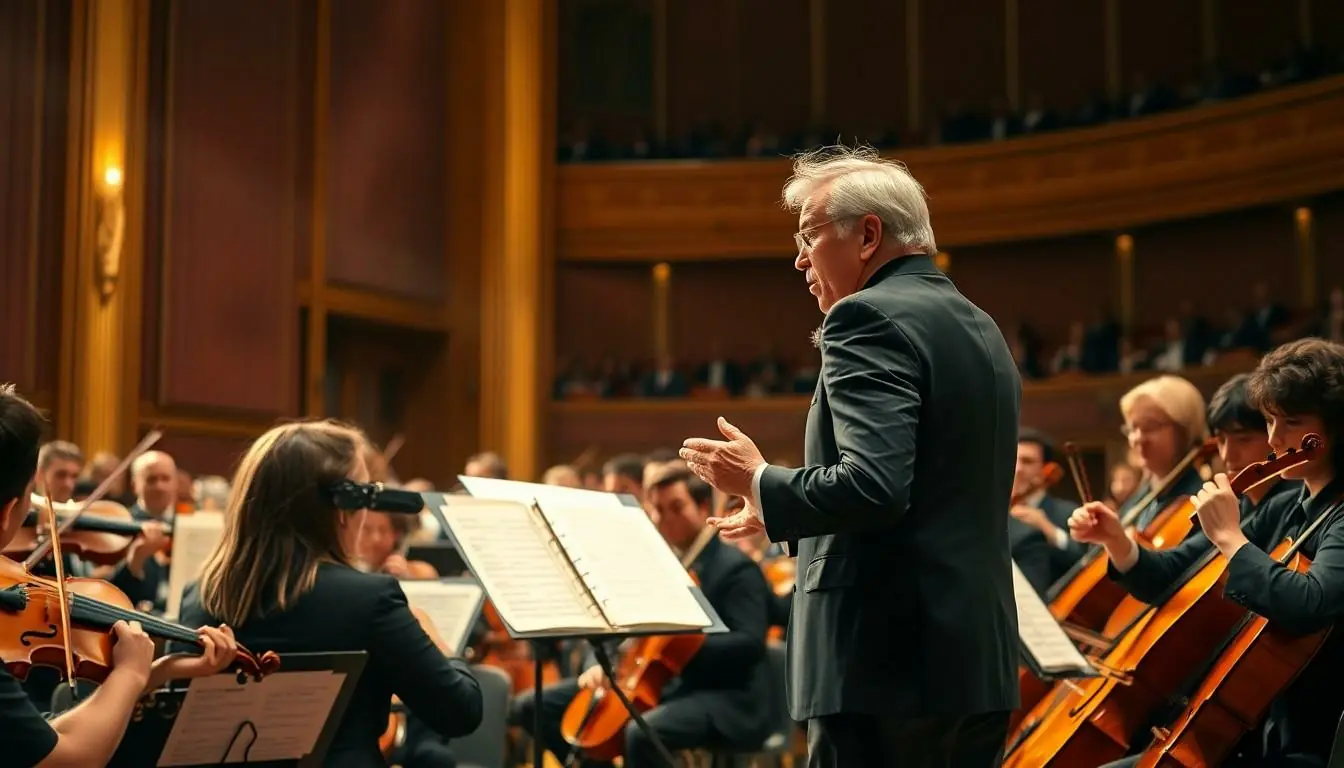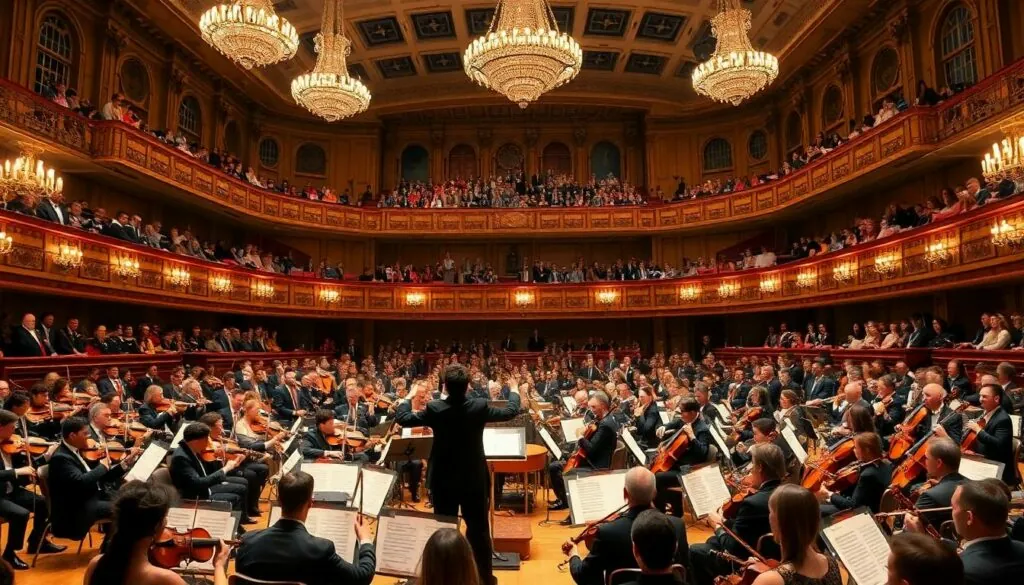Table of Contents
ToggleImagine sitting in a grand concert hall, the lights dimming as the London Philharmonia Orchestra takes the stage. The air buzzes with anticipation, and suddenly, the first notes of a timeless masterpiece fill the room. Classical music has a way of whisking listeners away to another world, and this article dives into the 50 greatest pieces that have stood the test of time.
Overview of the London Philharmonia Orchestra
The London Philharmonia Orchestra, founded in 1945, stands out as one of the leading orchestras in the UK. Situated in London, it performs a diverse repertoire, ranging from classical compositions to contemporary pieces. Renowned conductors like Esa-Pekka Salonen have shaped its artistic direction, ensuring high-quality performances.
This orchestra collaborates with esteemed soloists and composers, enhancing its credibility in the classical music community. Regular performances at venues such as the Royal Festival Hall and the Barbican Centre attract audiences from around the globe. The Philharmonia also engages in innovative projects that expand the classical music experience, including multimedia concerts and educational outreach programs.
With a commitment to recording, the orchestra holds a vast discography featuring notable works, preserving significant pieces of classical repertoire. Audiences benefit from the orchestra’s skill in interpreting various genres, creating rich musical experiences.
In addition to live performances, the Philharmonia embraces digital advancements. Streaming concerts and interactive applications provide listeners with access to their music anytime, anywhere. This adaptability helps promote classical music to new generations.
Membership in the Philharmonia frequently includes collaborations with other arts organizations, providing dynamic performances that enhance cultural life. Such partnerships enrich their programming and provide fresh content for audiences. The London Philharmonia Orchestra exemplifies a dedication to elevating classical music in modern contexts.
The Significance of Classical Music

Classical music holds a pivotal role in the cultural landscape. It transforms emotional experiences and shapes listener perceptions through its intricate compositions.
Historical Context
Classical music emerged in the Western tradition from the 11th century onward. This genre includes influential periods like the Baroque, Classical, Romantic, and Contemporary. Notable composers such as Johann Sebastian Bach, Ludwig van Beethoven, and Wolfgang Amadeus Mozart contributed masterworks that defined each era’s characteristics. Music has served not only as entertainment but also as an expression of societal values and historical events. Major milestones, including the transition from religious to secular themes, reflect changing cultural dynamics. Collectively, these developments illustrate the rich tapestry that classical music woven through time continues to influence audiences today.
Influence on Modern Music
Modern music draws heavily from classical traditions. Elements like orchestration, harmony, and melody find roots in earlier compositions. Many contemporary genres, including film scores and pop music, incorporate classical techniques to enhance emotional depth. Artists such as Ludovico Einaudi and Max Richter bridge classical styles with modern sensibilities. Additionally, classical motifs appear in hip-hop and electronic music, showcasing versatility across various platforms. The integration of classical elements highlights its enduring relevance in today’s musical landscape.
The 50 Greatest Pieces of Classical Music
Classical music comprises a rich tapestry of sounds and emotions. The 50 greatest pieces reflect a blend of historical significance and artistry.
Selection Criteria
In selecting these pieces, criteria focused on influence, popularity, and emotional impact. Compositions represent various eras, showcasing the evolution of classical music. Specific attention went to the works of renowned composers like Bach, Beethoven, and Tchaikovsky. Noteworthy performances by the London Philharmonia Orchestra added value, highlighting the accessibility of these masterpieces. Diversity in styles also played a role, ensuring a wide range of experiences for listeners. Musical techniques and innovative approaches helped distinguish these pieces as essential components of the classical repertoire.
Highlights of the List
Highlights include timeless works that resonate across generations. Beethoven’s Symphony No. 9 stands out for its monumental “Ode to Joy.” Tchaikovsky’s Swan Lake captivates with its romantic melodies and dramatic storytelling. Bach’s Brandenburg Concertos showcase intricate counterpoint, reflecting baroque brilliance. Mozart’s Eine kleine Nachtmusik enchants with its lively spirit and melodic charm. Each piece offers distinct emotional qualities, inviting listeners to engage with the music’s depth. The blend of orchestral textures in these highlights amplifies their significance, making them celebrated choices in concert halls worldwide.
Notable Performances by the London Philharmonia Orchestra
The London Philharmonia Orchestra consistently delivers memorable performances, captivating audiences with their artistic mastery.
Iconic Concerts
Several iconic concerts have defined the orchestra’s legacy. In 2016, their performance of Mahler’s Symphony No. 2 at the Royal Festival Hall showcased their exceptional precision and emotional depth. Another standout event occurred in 2018, when the orchestra presented works by contemporary composer Anna Clyne, highlighting their commitment to innovative programming. The stunning rendition of Stravinsky’s “The Firebird” captivated listeners, demonstrating the orchestra’s ability to blend classic and modern pieces effortlessly. Each concert not only celebrated orchestral tradition but also highlighted the Philharmonia’s role in pushing classical music boundaries.
Featured Musicians
Numerous distinguished musicians collaborate with the London Philharmonia Orchestra, enriching the overall experience. Renowned pianist Yefim Bronfman has frequently joined the orchestra, delivering stunning interpretations of concertos by Rachmaninoff and Beethoven. Violinist Nicola Benedetti also graced the stage, bringing her vibrant energy to performances of Tchaikovsky’s Violin Concerto. Furthermore, the orchestra often features acclaimed conductors like Esa-Pekka Salonen, who elevates each performance with his visionary approach. Engaging with such talented musicians enables the Philharmonia to maintain its prestigious reputation in the classical music realm.
The London Philharmonia Orchestra continues to be a beacon of classical music excellence. With its rich history and innovative approach, it brings timeless masterpieces to life, captivating audiences of all ages. The 50 greatest pieces of classical music not only showcase the orchestra’s artistry but also highlight the enduring power of these compositions.
As listeners explore these iconic works, they connect with the profound emotions and cultural narratives that shape our understanding of music. The Philharmonia’s commitment to accessibility and collaboration ensures that classical music remains vibrant and relevant in today’s world. Whether attending a live performance or enjoying a digital concert, the experience of classical music with the London Philharmonia Orchestra is truly unforgettable.





